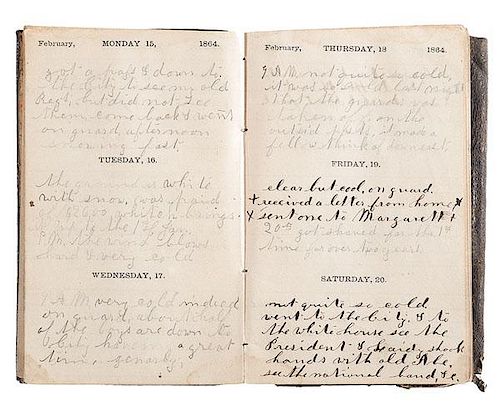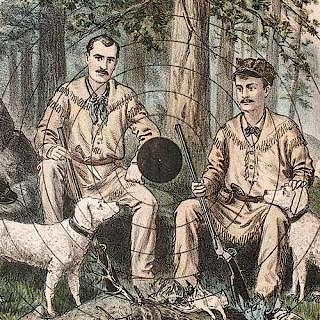Civil War Diaries of William Tufts, 4th Maine Infantry & Union Army Balloon Corps
About Seller
6270 Este Ave.
Cincinnati , OH 45232
United States
With offices in Cincinnati, Cleveland and Denver, Cowan’s holds over 40 auctions each year, with annual sales exceeding $16M. We reach buyers around the globe, and take pride in our reputation for integrity, customer service and great results. A full-service house, Cowan’s Auctions specializes in Am...Read more
Two ways to bid:
- Leave a max absentee bid and the platform will bid on your behalf up to your maximum bid during the live auction.
- Bid live during the auction and your bids will be submitted real-time to the auctioneer.
Bid Increments
| Price | Bid Increment |
|---|---|
| $0 | $25 |
| $500 | $50 |
| $1,000 | $100 |
| $2,000 | $250 |
| $5,000 | $500 |
| $10,000 | $1,000 |
| $20,000 | $2,500 |
| $50,000 | $5,000 |
| $100,000 | $10,000 |
About Auction
Nov 20, 2015 - Nov 21, 2015
Cowan's Auctions dawnie@cowans.com
- Lot Description
Civil War Diaries of William Tufts, 4th Maine Infantry & Union Army Balloon Corps
Lot includes 3 pocket diaries, for the years 1862, 1863, and 1864, all inscribed inside the front cover by William Tufts of Belfast, Maine, with a few lines to a full page of penciled text for each day. William Tufts II was a 29-year-old farmer living in Belfast when he enlisted in the 4th Maine Infantry on June 15, 1861. The Tufts family had been in Belfast since the colonial era and William’s volunteering for patriotic service was to be expected, as he was the namesake of his grandfather and an uncle who had died in fighting in the Revolution and War of 1812 respectively. Upon mustering as a private in Co. K, he was sent to Washington for training and spent the next several months in defense of the capital.
Tuft’s diary entries for the first few months of 1862 are rather pedestrian, with comments primarily regarding the weather and his guard duty schedule. In mid-March he finally left Washington and marched to Alexandria to board a steamer headed to Fortress Monroe as part of a flotilla of 16-18 vessels. When he arrived on March 18 he laid eyes on the recently-commissioned USS Monitor, which he described as “a funny looking craft.” He spent the next few weeks among what he estimated to be upwards of 20,000 army volunteers and sailors until being detailed to the “Balloon Regiment” on April 6, though he gives no reason for his selection.
Pvt. Tuft’s new assignment allowed him to witness and contribute to the development of the groundbreaking Union Army Balloon Corps, as well as access to several notable personalities. The previous year, President Lincoln and members of his cabinet had hand-picked Professor Thaddeus S.C. Lowe to be their “Chief Aeronaut” and command a corps responsible for providing airborne reconnaissance to generals in the field. Prof. Lowe had achieved some success with his early designs but a few embarrassing failures and the overall unreliability of the program forced Lowe to undergo further trials in the spring of 1862. Things were still going rough when Tufts arrived at the trail site along the York River in Virginia, as his entry for April 11 states that Gen. Porter went up in a balloon but the rope broke and he ended up crashing down two miles away. Nonetheless, the general recognized the potential of the program and went up again three days later with the Rebel lines just 1.5 miles away. Tufts himself got to take his first excursion on April 16 when he accompanied Gen. Barnard on a trial. On the 28th, Prof. Lowe arrived with his newest balloon, the Intrepid, which had been designed to reach higher elevations and to be able to support a load including a telegraph and operator. Gen. Heintzelman would later credit Intrepid’s support with saving the Union forces from certain defeat at the Battle of Fair Oaks just one month later.
Diary entries for the month of May note a visit by Gen. McClellan on May 2, being able to hear artillery fire the following day, and dining on “secesh pork” and sleeping in “secesh tents” after repulsing the enemy. Tufts met with a “Prof. Munsey” on the 9th, and on the 14th assisted Prof. Lowe in transporting a balloon to near Richmond via steamer. On June 1st Tuft reports on a successful telegraph transmission between an airborne balloon and Washington, DC, and notes on June 14th that the balloon was photographed. July’s entries include almost-daily balloon flights, including a successful flight in the presence of President Lincoln on July 8: “…sent balloon up once….all day president & Gen. Scott was heer to see the troops.” The following week saw more success, with Tuft assisting in inflating a balloon on board a boat, but he spent the last two weeks of the month in the regimental hospital sick with dysentery. He returned to duty on August 2 but it would be his last month in the Balloon Corps, as on Sept. 1 he got lost in the woods between Centerville and Fairfax and was taken prisoner.
Pvt. Tufts was taken to Annapolis where he describes poor conditions, though he and a group of six to eight prisoners were able to improve their lot substantially by building a crude shack and procuring a stove in November. He was paroled in December but unable to find his regiment and writes of hearing rumors that many of them were killed, and when he finally joined up with his original regiment nearly two months later he became ill. Tufts spent the majority of 1863 in and out of various convalescent camps including the Lincoln Hospital in Washington, and was transferred into the Veteran Reserve Corps in September on account of his health. His entry for Nov. 26 mentions celebrating Thanksgiving, as proclaimed by Lincoln, with a feast of turkey, roast beef, potatoes, and two types of pie, but not partaking in the drinking, dancing, and gambling of some of his buddies as he could only thing about being able to go home to Maine go to church. Tufts remained in Washington for the next several months. He decorated the hospital with evergreens for Christmas and obtained passes to the Smithsonian Institution, Patent Office, Capitol Building, and other attractions. When he visited the White House on February 20, 1864, he got to see a performance of the National Band and was introduced to the President and First Lady; the entry for that day includes the line “shook hands with Old Abe.”
Meeting Lincoln was Tuft’s last experience of note. He remained at the hospital and did things such as make gruel and tend to other patients when well enough. He mustered out on June 15, 1864, fulfilling his three-years enlistment to the day, said goodbye to his friends at Lincoln Hospital, and boarded the train to Boston, were he treated himself to new clothes and a fancy dinner on Boston Common. Tufts reports his health returned nearly as soon as he reached Belfast and began working the farm, and on August 29 he and his father purchased a new one.
Timeline examples of notable events and entries:
1861:
6/10: Left home in Belfast, Maine
6/15: Enlisted as private in Co. K, 4th Maine Infantry
6/20: Arrived in Washington, DC. Drilled and put on guard duty.
1862:
3/17: Marched to Alexandria to get on steamer to Fortress Monroe, part of flotilla of 16-18 boats
3/18: Arrived at Fortress Monroe; saw Monitor, “a funny looking craft”
3/20: At Monroe with nearly 20,000 troops
4/6: Detailed to balloon regiment
4/11: Gen. Porter went up in balloon and rope broke, but he came down safely 2 miles away
4/14: Within 1.5 miles of Rebels; Gen. Porter went up in a balloon
4/16: Went up in a balloon with Gen. Barnard
4/28: Prof. Lowe arrived with new balloon, the “Intrepid”
5/2-3: Gen. McClellan present; shells coming very close
5/5: Slept outside Yorktown in “Secesh” tents
5/6: Dined on “Secesh” pork and flour
5/9: Prof. Munsey with him
5/14: Near Richmond, transporting balloon by steamer with Prof. Lowe
5/23: Mentions Gen. Stoneman and the USS Constitution
6/1: Telegraphed Washington from airborne balloon
6/14: Balloon was photographed
7/8: PRESIDENT LINCOLN and Gen. Scott visit
7/18: Sick with dysentery in regimental hospital
8/2: Return to balloon detail
8/20: On board the Merrimack headed downriver
9/1: Between Centerville & Fairfax, got lost in the woods, feet hurt too much to keep up with regiment and was taken POW; prisoners taken to Annapolis
10/xx: Built a shack for 6-8 prisoners to live in – most others in tents
11/26: Finally got a stove in their shack
12/xx: Paroled and attempts to rejoin regiment after about 3 months as POW; cannot locate regiment but hears from others that many have been killed; says he hated being a POW due to the boredom and inactivity.
1863:
1/xx: In convalescent camp, cold and wet, not enough to eat; examined for fitness to return to regiment but denied
2/4: Returns to regiment by foot (12 miles)
2/5: Inspected and approved but is without a gun
2/15: On guard duty
2/16: Suffering from diarrhea and cankers
3/xx: Detailed to work on roads
5/xx: Regiment is in battle but Tufts on light duty because of explosive diarrhea
6/6: Sent to convalescent camp
6/19: Returns to the front
6/27: 8 miles from Harper’s Ferry
9/1/1863: Transferred into VRC
9/23: Back to Washington and his old camp
10/1: Back in the convalescent camp
10/10: On guard duty at Lincoln Hospital
11/26: Celebrates Thanksgiving (as proclaimed by Lincoln) with turkey, roast beef, potatoes, two kinds of pie; says his buddies drink and dance but he doesn’t like to and wishes he was home so he could go to church
12/10: Visits Smithsonian Institute
12/23: Decorates mess hall with evergreens for Christmas
12/25: Feast of turkey, chicken, and pie for Christmas
12/31: Celebrates NYE with roast beef, mashed potatoes, lager beer; most of the boys get drunk, which Tufts does not approve of
1864:
1/1: On guard duty at Lincoln Hospital
1/27: Visits old Congressional burial ground
1/29: Obtained pass to visit Patent Office, Smithsonian, and Capitol Building
2/19: Shaved for first time in over two years
2/20: Visited White House and got see PRESIDENT LINCOLN & Mary Todd – “Shook hands with old Abe” – also saw national band
5/15: Sister of Charity detailed him to carry gruel to patients
6/15: Mustered out of service, three years to the day
6/17: Leaves Lincoln Hospital, takes express train to Boston
6/18: Passes through NYC and arrives in Boston
6/19: Spent the day on Boston Common
6/20: Buys new clothes, goes out for tea and pie, then boards train back home to Belfast
6/21: Arrives home at the farm I Belfast
7/xx: Working the farm and feeling much better, diarrhea and appetite much improved
8/xx: Looking at farms for his father who wants to buy one
8/29: Buys farm - Shipping Info
-
SHIPPING. At the request of the buyer, Cowan's will authorize the shipment of purchased items. Shipments usually occur within two weeks after payment has been received. Shipment is generally made via UPS Ground service. Unless buyer gives special instructions, the shipping method shall be at the sole discretion of Cowan's Auctions, Inc.. Cowan's is in no way responsible for the acts or omissions of independent handlers, packers or shippers of purchased items or for any loss, damage or delay from the packing or shipping of any property.
-
- Buyer's Premium



 EUR
EUR CAD
CAD AUD
AUD GBP
GBP MXN
MXN HKD
HKD CNY
CNY MYR
MYR SEK
SEK SGD
SGD CHF
CHF THB
THB

















